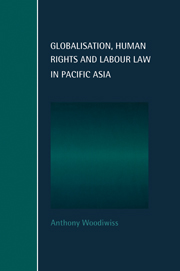Book contents
- Frontmatter
- Contents
- List of figures
- Acknowledgements
- CONVENTIONS
- Introduction: the ‘clash of civilisations’ and the problem of human rights
- PART ONE Against absolutism and relativism: towards a globally enforceable concept of human rights
- 1 Transnational sociality, sociological theory and human rights
- 2 The challenge of Pacific capitalism: from Pax Americana to the Japanese Way?
- PART TWO Human rights, labour law and patriarchalism in Pacific Asia
- Conclusion
- Notes
- References
- Index
1 - Transnational sociality, sociological theory and human rights
Published online by Cambridge University Press: 07 May 2010
- Frontmatter
- Contents
- List of figures
- Acknowledgements
- CONVENTIONS
- Introduction: the ‘clash of civilisations’ and the problem of human rights
- PART ONE Against absolutism and relativism: towards a globally enforceable concept of human rights
- 1 Transnational sociality, sociological theory and human rights
- 2 The challenge of Pacific capitalism: from Pax Americana to the Japanese Way?
- PART TWO Human rights, labour law and patriarchalism in Pacific Asia
- Conclusion
- Notes
- References
- Index
Summary
These are anxious as well as exciting times in the social sciences, just as they are in the world at large. Disciplinary blocs and the relative security they brought with them are collapsing as fast in the social sciences as they are in the world which they seek to understand. However, it would be most unwise to dissolve the blocs within which intellectuals are organised as quickly as the nations of the world have dissolved the geopolitical blocs into which they were so recently organised. This is because, at first sight paradoxically, a critical condition of the possibility of knowledge is acceptance of disciplinarily imposed limits to what can be known. That is, to paraphrase Michel Foucault (1974), it is the abstraction from the real produced by the operation of the pertinent ‘rules of formation’ of disciplines that results in the differentiation of knowledge from non-knowledge. This said, provided that the term ‘inter-disciplinary’ is taken literally and not as legitimating an intellectual cafeteria, social scientists are nevertheless in some ways more free than nation states to take advantage of the opportunities created by the present state of flux and so overcome the intellectual blindspots resulting from years of thinking in blinkered mono-disciplinary terms. For these reasons, then, I will trespass below on the territory of many other disciplines – History, Law and Asian Studies, in particular – but I will do so strictly and only as a sociologist interested in the macro-sociology of law and human rights.
- Type
- Chapter
- Information
- Publisher: Cambridge University PressPrint publication year: 1998



